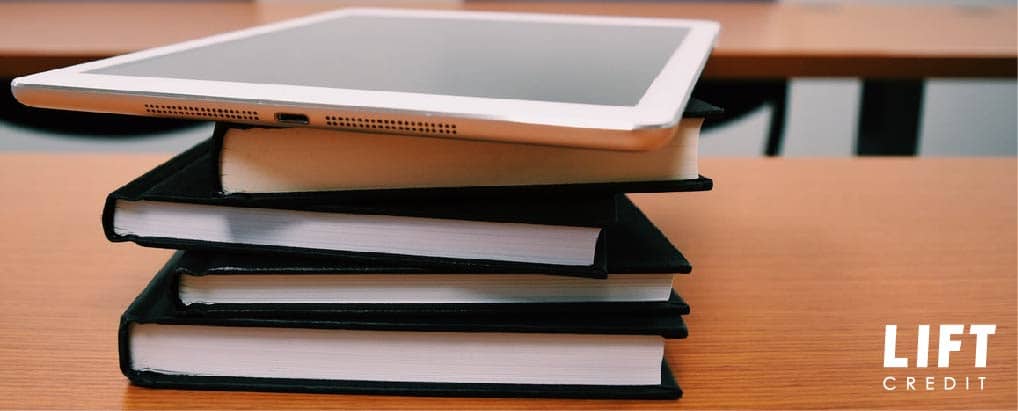You’re in college, and you’ve got a lot going on. Why take a personal finance class in college and add one more thing to your already very full plate? Because solid foundations in personal finance early on lead to a lifetime of financial freedom.
We’re going to dive into what personal finance is, what they teach in personal finance classes, and other ways to learn personal finance. Keep reading to get the rundown of what you’ll learn as a financial literacy college student.
What is Personal Finance?
According to Investopedia, “Personal finance is a term that covers managing your money and saving and investing.” So basically, learning personal finance is learning how to use your money responsibly so you can be financially free.
Some courses may have a section on career planning. That obviously impacts your income, but most of the course will be focused on how to use the money you have. In most cases, you can be completely financially free no matter your income. It’s definitely more difficult in some situations, but financial freedom is possible for everyone.
Foundations in personal finance can be a very broad topic. It can cover everything from how to get the best bang for your buck at the grocery store to navigating the ins and outs of life insurance policies.
What Do They Teach in Finance Classes?
We can’t cover an entire semester of material in one blog post, but here’s a summary of what you’ll get from a course on foundations in personal finance.
Compounding Interest:
Einstein called compounding interest the 8th wonder of the world because of its power in finances. If you understand how to use compounding interest and use it early, retirement will be good to you. If you let it play against you, finances will probably be a big struggle.
So what’s compound interest? Check out this link, or take a personal finance class to find out!
Starting to use compounding interest now as opposed to only 2 years from now can make a difference of tens of thousands of dollars when you retire.
Getting out of Debt
Basically the lesson here is to get out of debt as fast as possible. With that said, there are definitely some nuances in how that’s done wisely. Doing it the wrong way can be extremely frustrating and can even put you deeper in debt. So go to class and learn to do it the right way.
Calculating Mortgages

Buying a house is a big deal. Putting your name on a $200,000 contract should be no small decision. Your foundations in personal finance course will help you figure out how to negotiate the best deal on your mortgage, how much house you can afford, and how to shop for the best deal.
A house is probably the biggest expense you’ll make in your life. Get some help so you can make smart decisions as you go through that process.
Taxes
You may not think about taxes very much, but they’re actually one of the biggest expenses you have. Your class will teach you to calculate your taxes and make sure you’re paying all the taxes you should. No more, no less.
Maintaining Good Credit
Your credit score can have a huge effect on your financial situation. If you have a good credit score you’ll get a lower interest rate on credit cards and loans. For example, if you take out a loan for a car, you’ll have to pay the lender back for the price of the car plus some interest. If you have a good credit score, you’ll pay the lender back for the price for the car plus less interest.
Having a lower interest rate on credit cards and loans can make a huge difference in what you actually end up paying if you borrow money.
Buying a car

Speaking of buying a car, it can be tricky business. Should you buy a new car to save on maintenance, or an old beater to save on initial cost? That’s a simple question with a complicated answer. So take a personal finance class to learn the ins and outs of buying a car responsibly.
Insurance
If you’re on your parents’ insurance, there’s a whole world that you haven’t opened your eyes to yet. Health insurance, car insurance, life insurance are all things that you now have to think about. It can be a pretty complicated industry, and jumping in without some help can be overwhelming. So go to class and figure it out.
How Else Can I Learn Personal Finance
Podcasts can be a great source of information no matter what it is you’re curious about. Lift Credit has a curated list of great personal finance podcasts, so check those out!
We also dedicate our entire blog to helping you become financially free. So keep looking around. There’s definitely something here for you.
There are also tons of books out there on personal finance. One of the most popular ones is by personal finance guru Dave Ramsey. One of his books is called, “The Total Money Makeover.” That’s a great place to start, but his whole website has a lot of good stuff in it.
You may not be in a position to pay for a professional financial advisor, but you don’t necessarily need one. Find a friend, parent, or other family member who’s been there and can show you the ropes.
Conclusion
Learning the foundations of personal finance can be daunting, but financial literacy is an important thing to learn for college students. It can be complicated to figure out on your own, so it’s definitely worth taking a class to help you out. If that’s not an option for you, don’t worry, there are plenty of other ways to become financially savvy.









